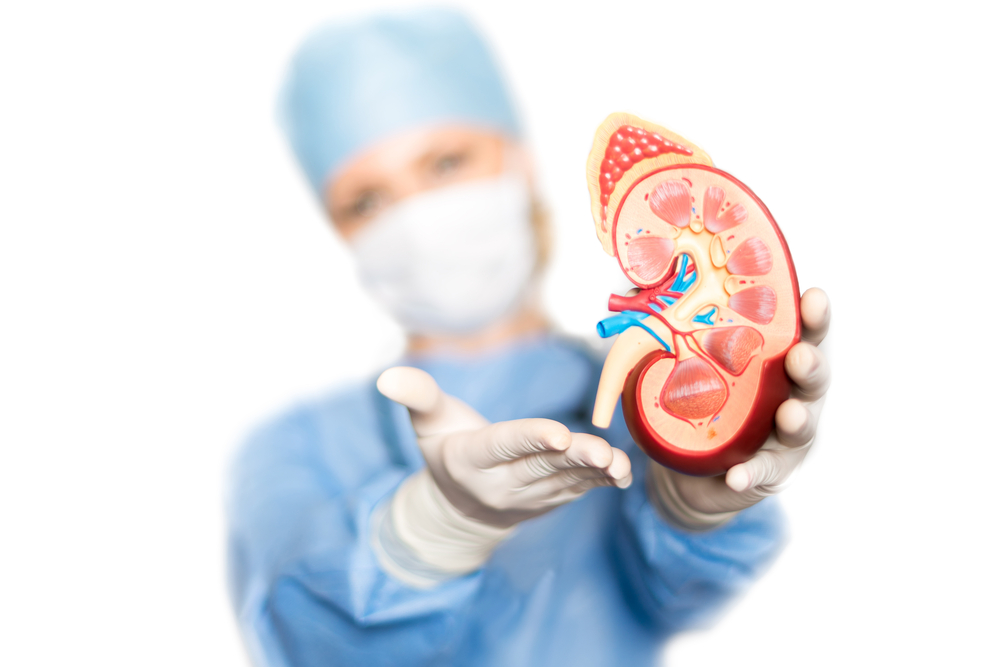Investigational Cell Therapy FCR001 Shows Promise for Preventing Post-transplant Kidney Failure

Results from a Phase 2 clinical trial support the potential of Talaris Therapeutics’ investigational cell therapy FCR001 to prevent recurrence of kidney failure in patients who have undergone a living donor kidney transplant, including patients with Alport syndrome.
The data were presented at the 2019 American Society of Nephrology (ASN) Kidney Week conference, Nov 5-10 in Washington, D.C. The findings were explained in a poster titled “Durable Donor Hematopoietic Stem Cell (HSC) Chimerism Is Associated with Protection from Native Renal Autoimmune Disease Recurrence in Recipients of Combined Stem Cell/Kidney Transplants.”
The company is conducting a Phase 3 trial called FREEDOM (NCT03995901), which will evaluate FCR001 versus standard-of-care immunosuppression in patients receiving their first kidney transplant from a living donor. The trial is now enrolling patients at Chicago’s Northwestern Memorial Hospital. More information about contacts and locations can be found here.
Several conditions, including IgA nephropathy (IgAN), focal segmental glomerulosclerosis (FSGS), and Alport syndrome, cause end-stage renal disease, or kidney failure. This forces many patients to undergo a kidney transplant from a living donor. However, many of these patients see their disease return after the transplant, which is potentially harmful to the grafted kidney and can compromise the transplant.
FCR001 is an investigational, allogeneic cell therapy developed to avoid the rejection of a transplanted organ. The treatment is designed to induce patients’ immune tolerance or to restore it in patients who have lost their own self-tolerance due to certain disorders.
One of its key aspects is the collection of tolerogenic facilitating immune cells from the donor prior to the transplant. These cells help create an immune environment that is unresponsive, or tolerant, to the donor organ. Under FCR001 procedure, these cells are collected from the donor some weeks before the transplant, cryopreserved and then injected into the recipient by the time of the transplant. At the same time, hematopoietic (blood-forming) stem cells (HSCs) from the donor are also injected. If the cell therapy is successful, the patient will produce both his or her own immune cells and the donor’s immune cells, a mixed condition termed chimerism.
The objective is that this combination of HSCs and facilitator cells boosts the body’s natural mechanisms to see a donor organ as “self” and not attack it.
FCR001 was granted both Orphan Drug Designation and Regenerative Medicine Advanced Therapy (RMAT) designation from the U.S. Food and Drug Administration.
Talaris’ Phase 2 clinical trial enrolled 12 subjects with kidney failure as a result of a disease — six with IgAN, two with FSGS, two with membranous glomerulonephritis and two with Alport syndrome.
Within this group, seven patients had durable chimerism, indicating FCR001’s successful transfer. One year after the transplant, all these patients were successfully weaned off immunosuppressive therapy — needed to prevent organ rejection post-transplant, but whose chronic use can bring about serious side effects. This indicated that patients successfully created tolerance with FCR001.
FCR001 was successful in two patients with FSGS, a particularly aggressive condition, researchers noted.
Thus far, all seven patients have remained free of their prior disease.
Of the five patients who displayed either transient or no immune chimerism, the prior disease came back in two cases.
There were no kidney rejections or patient deaths and, to date, kidney function has been excellent in all 12 patients in the trial, the researchers said.
“In conclusion, durable chimerism using the FCR001 approach protects against recurrent [autoimmune disease],” they said, adding that this approach “may be particularly suited for patients at high risk for disease recurrence [post-kidney transplant], such as FSGS.”
“We’re very excited by this demonstration of the potential of FCR001 to durably reset the immune system and halt autoimmune disease in patients in our Phase 2 trial. Many autoimmune diseases of the kidney are not resolved by a conventional kidney transplant, and therefore patients may require multiple transplants over the course of their lives. We’re hopeful that our cell therapy could interrupt this cycle of repeat transplants,” Scott Requadt, Talaris’ CEO, said in a press release.
“Talaris plans to build upon these promising findings in an upcoming Phase 2 trial, in which we will evaluate the potential of FCR001 to treat certain severe autoimmune or immune-mediated disorders,” he added.







Leave a comment
Fill in the required fields to post. Your email address will not be published.